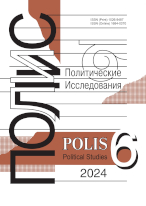Crisis of Russia’s multiparty system
Kozyreva P.M.,
Dr. Sci. (Soc.), First Deputy Director of the Federal Center of Theoretical and Applied Sociology of the Russian Academy of Sciences; Head of the Center for Longitudinal Studies at the Institute for Social Policy of the National Research University Higher School of Economics, pkozyreva@isras.ru
elibrary_id: 346897 | ORCID: 0000-0002-3034-8521 | RESEARCHER_ID: F-2538-2014
Smirnov A.I.,
Doctor of Sociology, Senior researcher, Institute of Sociology of the Federal Center of Theoretical and Applied Sociology of the Russian Academy of Sciences, smir_al@bk.ru
elibrary_id: 678594 | ORCID: 0000-0001-7078-6203 |
DOI: 10.17976/jpps/2014.04.06
Kozyreva P.M., Smirnov A.I. Crisis of Russia’s multiparty system. – Polis. Political Studies. 2014. No. 4. https://doi.org/10.17976/jpps/2014.04.06
The article states that multi-party system developed in Russia in the wake of radical reforms, has been in a constant state of crisis. Based on the data from representative sociological surveys it examines the signs and the main causes of the crisis, paying special attention to peculiarities of the modern transformation of multiparty system. The authors emphasize that the ongoing changes of party policy implemented “from the top” to optimize the party system, only hinder the creation of a truly competitive political parties and disorient people. Recent years have seen the low level of trust in political parties, lack of interest in their activities, weak linkages of large groups of population with traditional political institutions, the constant loosening of newly formed party loyalties. Compared to modern democratic societies, where parties are viewed as the most important structural and functional elements of the political organization of society, in Russia political parties are estimated by a large majority of citizens as less important in comparison with other political institutions. Russians claim that the possibilities of the parties, except for the ruling party, to adequately respond to the increased demands and requirements of groups whose interests they express are very much limited. There are noticeable signs of weakening of the opposition parties in the Duma, not able to compete with the ruling party. As well as strengthening of barriers to the creation of new authoritative political forces capable to improve political life in the country. The authors emphasize that constant and considerable changes of party politics prevent the establishment of a stable system of party loyalties, weaken the dependence of political behavior of citizens on society traditions of political choices and increase the likelihood of unpredictable political behavior. Analysis of the balance between the party reform plans and mass political sentiments leads to the conclusion that the course of creation of a multi-party system with wide pluralistic orientation finds no support in the overwhelming majority of Russians.
See also:
Simonov K.V.,
Does Russia Need a Bipartisan System?. – Polis. Political Studies. 2015. No2
Makarenko B.I.,
Post-soviet party of power: the «United Russia» in a comparative context. – Polis. Political Studies. 2011. No1
Paskhina I.S., Telin K.O.,
"Party Zero": Russian Elections Through the Prism of the Effective Number of Parties. – Polis. Political Studies. 2017. No5
Peregudov S.P.,
Russia’s political system: experience of social engineering projections (based on the materials of the ISP report). – Polis. Political Studies. 2009. No6
Marchenya P.P.,
Russian Multiparty System: The Cradle of Civil Society or the Tomb of Imperial Statehood?. – Polis. Political Studies. 2017. No1





.jpg)






 print
print
.jpg)
.jpg)